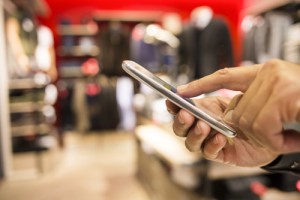Mobile vs desktop, laptop and kiosk
 Mobile devices are now the main route for browsing online, highlighting now more than ever the decline of the desktop and laptop in this consumer popular past-time.
Mobile devices are now the main route for browsing online, highlighting now more than ever the decline of the desktop and laptop in this consumer popular past-time.
All is not yet entirely lost however, as sales made by mobile, smart phone and tablet, currently only account for a about a third total sales for e-retailers, but for how long? The latest IMRG Capgemini Quarterly Benchmarking Report shows that the total estimated online spend during May to July was £24.2 billion, with £8.7 billion spent via smartphones and tablet devices.
IMRG chief information officer, Tina Spooner, said: “With over half of all e-retail traffic now coming via smartphones and tablet devices, the latest results reveal a huge landmark in the growth of mobile commerce. These results clearly demonstrate that retailers’ investment in mobile optimisation is encouraging consumers to adopt mobile devices as a shopping platform.”
Alex Smith-Bingham, Capgemini digital services leader and vice president, adds: ‘Whether you’re shopping on your tablet from the comfort of your couch or on your smartphone during your daily commute, mobile offers the customer unparalleled convenience. It’s no wonder then that we’ve hit such a significant milestone in a relatively short period of time. As retailers further develop their m-commerce platforms and as the technology becomes increasingly more sophisticated, we’ll see the role of the desktop in our day-to-day shopping cycle diminish. It will be very interesting to see just how wide the gap between mobile and traditional e-retail will become in 12 months’ time.’
Despite the apparent growth and threat of mobile to other technologies, brick and mortar retailers are still being given technology options to, rightly or wrongly, work alongside mobile use in store.
The latest opportunity to enhance the customer shopping experience comes in the form of a virtual expert in every aisle. By using what’s being called as Point-of-decision kiosks, retailers can encourage customers to buy the product that they are looking at by providing expert information literally off the shelf. The technology comes from Fujitsu, a leading information communication technology company, and OnCue Technologies, which have made an International Distribution and License Agreement. “These solutions fill the gaps that exist today in the aisle by providing comprehensive knowledge about products, inventory and availability for when your smartphone isn’t smart enough. Our relationship with OnCue strengthens our ongoing commitment to helping retailers improve the consumer shopping experience.
Rivalling the mobile device, the shelf-based kiosks can help with shopper requests, barcode scanning, and shopping list and coupon printing. They can also show promotions to passing customers when not in use. While the solution is certainly helpful to the consumer, it also allows the retailer to control what information is being given to the customer and has no mention of price comparisons or reviews, two things that currently tend to draw the customer to pull out their mobile device.
So, whether the on-shelf kiosk will go down well with consumers is yet to be seen. OnCue think it will be: “We believe that retail stores are at a tipping point and there needs to be a dramatic change in customer engagement to leverage web technologies to improve the bottom line,” said Dionne van Zyl, chief executive officer at OnCue Technologies.


No comments yet.